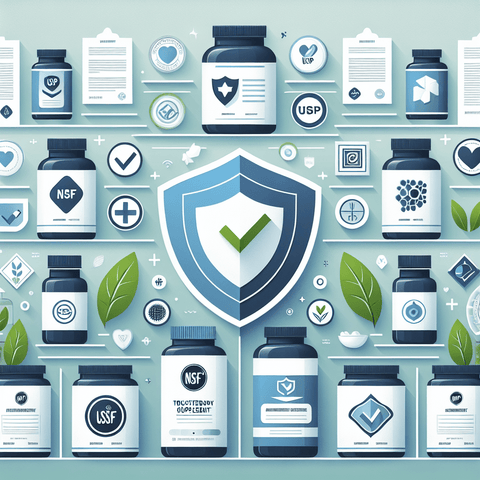In an increasingly health-conscious world, consumers are bombarded with an abundance of nutritional supplements promising enhanced wellness, increased energy, and overall vitality. However, amidst the myriad of options, how can consumers differentiate between high-quality, safe, and efficacious products and those that fall short? The answer lies in understanding supplement certification — the rigorous processes and standards that ensure a supplement’s safety, potency, and transparency. This comprehensive guide explores the critical aspects of supplement certification, how to identify trustworthy products, and practical tips to empower your health choices. Dive into the truth about supplement certification and discover how to select nutritional products that truly support your well-being.
Understanding Supplement Certification: The Foundation of Trust in Nutritional Supplements
Supplement certification refers to the verification process whereby independent organizations or governing bodies evaluate a dietary supplement's ingredients, manufacturing practices, and overall quality. Unlike simple label claims or marketing slogans, certification is an objective, third-party validation that a product meets specific standards for purity, potency, and safety. This process is essential for consumers because it serves as a trust signal — a guarantee that what is on the label corresponds accurately to what is inside the product, free from harmful contaminants, mislabeling, or adulteration.
Many consumers assume that FDA approval or registration alone suffices to attest supplement quality. However, in reality, dietary supplements are regulated as food products in many jurisdictions, which means they do not require pre-market approval like pharmaceuticals. Certification, therefore, acts as an extra layer of assurance, confirming that a product complies with existing regulations and industry standards.
Common misconceptions revolve around the idea that all labeled supplements are equally trustworthy. In fact, supplement labels can sometimes be misleading, omitting key information about ingredient purity or failing to disclose contaminants or fillers. Certification helps dispel these false perceptions by providing independent verification, giving consumers confidence that the product they purchase is of high quality and safe for consumption.
The Role of Third-Party Testing in Ensuring Supplement Quality
Third-party testing organizations play a pivotal role in establishing and maintaining supplement quality. Reputable organizations like NSF International, United States Pharmacopeia (USP), and Informed-Choice rigorously evaluate dietary supplements through comprehensive testing protocols. These tests examine raw ingredients, finished products, and manufacturing processes to verify claims and detect potential contaminants.
Third-party testing involves analytical laboratories analyzing samples to confirm ingredient purity and potency, checking for contaminants such as heavy metals, pesticides, bacteria, mold, and synthetic fillers. For example, supplements claiming to contain a specific amount of vitamin D [link to https://www.topvitamine.com/collections/vitamin-d-benefits-sources-safety] are independently tested to verify these claims, ensuring consumers are not misled.
Verification by trusted organizations significantly impacts consumer confidence because it provides an unbiased view of product quality. When a supplement bears a third-party certification seal, it indicates that the product has undergone rigorous testing and meets established standards, reducing the risk of adverse effects or ineffective results. Consumers should look for certifications from organizations like NSF, USP, or Informed-Choice as a default sign of quality assurance.
For instance, many brands, including those offering omega-3 [link to https://www.topvitamine.com/collections/dha-epa-omega-3-supplements], vitamin K, magnesium, and other critical nutrients, seek third-party verification to appeal to health-conscious buyers. Recognizing certification seals on labels or packaging allows consumers to make more informed and safer choices in their supplement purchase journey.
Implementing Quality Assurance Standards to Maintain High Product Integrity
Quality assurance standards form the backbone of consistent product safety, quality, and efficacy. Implemented throughout the manufacturing process, these standards establish protocols that prevent contamination, mislabeling, and subpar quality. One of the most widely recognized standards is Good Manufacturing Practices (GMP), established by regulatory agencies like the FDA. GMP guidelines specify requirements for facilities, equipment, personnel training, record-keeping, and quality control procedures.
ISO certifications further bolster quality assurances by defining international standards for safety, efficiency, and quality management systems. For dietary supplements, ISO 22000 or ISO 9001 standards may be relevant, depending on the manufacturing process. Compliance with these standards indicates rigorous adherence to safety protocols, consistent production practices, and continual improvement, ensuring consumers receive products that are safe and consistent in quality.
High-quality supplement manufacturers implement strict quality assurance processes, including raw material testing, in-process controls, and final product inspections. Continuous audits and monitoring ensure that product integrity is maintained across batches, reducing risks associated with mislabeling or contamination. For example, supplement brands dedicated to high standards, such as those offering magnesium [link to https://www.topvitamine.com/collections/magnesium-benefits-energy-muscle-bone-support], routinely verify ingredient sources and conduct potency testing to deliver reliable, effective products.
Navigating the Supplement Verification Process for Consumer Confidence
Understanding the verification process can seem complex, but it’s vital for consumers committed to making informed choices. Typically, a supplement undergoes several key steps before reaching shelves:
- Raw ingredient sourcing is verified to ensure authenticity and purity.
- Manufacturer implements GMP and quality control measures.
- Finished products are subjected to third-party testing to confirm label claims and safety.
- Certification seals are obtained from reputable organizations, indicating compliance.
- Documentation, including test reports, Certificates of Analysis (COA), and audit reports, are made available for review.
Consumers should look for clear, verifiable documentation—such as test reports or certification seals—on packaging or the manufacturer’s website. Recognizing the difference between claims of “certified” and “verified” is important; certification indicates adherence to recognized standards from independent bodies. Many brands display badges from organizations like NSF or USP, revealing their commitment to quality. When in doubt, requesting additional documentation or consulting trusted sources can enhance confidence in a product.
The Significance of Manufacturing Accreditation in Supplement Production
Manufacturing accreditation signifies that the facilities producing supplements meet strict safety, quality, and regulatory requirements. Organizations like NSF International and cGMP (current Good Manufacturing Practices) certification validate that manufacturing plants adhere to standardized operational protocols.
Accredited manufacturing facilities implement rigorous controls to prevent contamination, ensure proper storage, and maintain hygiene standards. They also employ validated production processes, including traceability and batch testing, to ensure each lot of product meets predefined standards. This reduces the likelihood of issues such as adulteration or inconsistent potency.
Choosing supplements from accredited manufacturers guarantees that the entire production process—from ingredient sourcing to packaging—is consistently monitored and compliant with high safety standards. For example, a supplement manufacturer with NSF accreditation or cGMP certification demonstrates a commitment to quality assurance that consumers can trust, especially when selecting critical nutrients like vitamin K [link to https://www.topvitamine.com/collections/vitamin-k-benefits-bone-blood-health] or omega-3 fatty acids.
Ensuring Safety Compliance Certifications for Consumer Peace of Mind
Beyond manufacturing standards, safety certifications focus on preventing contamination, adulteration, or health hazards. Examples include FDA registration (which entails compliance with safety regulations) and HACCP (Hazard Analysis and Critical Control Points), a systematic approach to identifying and controlling potential hazards in food production.
Such safety certifications confirm the product has been produced under controlled environments, with measures in place to prevent microbial contamination, toxin presence, or incorrect labeling. This is particularly important for supplements like vitamin D [link to https://www.topvitamine.com/collections/vitamin-d-benefits-sources-safety], which require careful handling to avoid contamination or degradation.
Consumers can verify safety compliance by requesting documentation, such as safety data sheets or certificates, and by choosing brands with transparent safety protocols. Ensuring a supplement meets local and international safety guidelines significantly reduces health risks and contributes to long-term health benefits.
Practical Tips to Recognize and Choose Certified, High-Quality Supplements
Armed with knowledge, consumers can adopt practical strategies to select the best supplements:
- Look for certification seals from reputable organizations on the label, such as NSF or USP.
- Review the company’s website for third-party testing reports, Certificates of Analysis, and manufacturing certifications.
- Ask retailers or manufacturers specific questions about ingredient sourcing, testing procedures, and quality assurance practices.
- Prioritize brands with transparent policies and consistent certification adherence.
- For broad health support, consider trusted product categories like Vitamin C [link to https://www.topvitamine.com/collections/vitamin-c-benefits-immunity-antioxidant-energy], Vitamin D, or Omega-3s, which are often rigorously tested and certified.
Choosing trusted brands that prioritize transparency and certification not only minimizes risks but also maximizes the potential health benefits of supplements. Reliable sources and vigilant reading of labels can ensure you’re investing in products that uphold high standards of safety and efficacy.
Conclusion: Empowering Consumers Through Knowledge and Certification
In today’s market, supplement certification acts as an essential safeguard for consumers seeking safe, effective, and reliable nutritional products. Certifications from third-party organizations, adherence to GMP and quality standards, and transparent safety protocols are indicators of a product’s integrity. Recognizing and understanding these signals allows consumers to make informed choices, minimizing risk and maximizing potential health benefits.
By prioritizing certified supplements, you can confidently support your wellness goals, knowing that your investments are backed by rigorous testing and standards. Remember, your health is your most valuable asset—empower yourself with knowledge, seek verification, and make choices that align with your well-being. Stay vigilant, ask questions, and choose products from reputable sources to enjoy the full benefits of high-quality supplements.
Q&A Section
Q1: Why is supplement certification important?
Supplement certification provides independent verification that a product meets safety, potency, and quality standards. It assures consumers that the supplement contains the ingredients listed, is free from contaminants, and complies with regulatory requirements, reducing health risks and ensuring efficacy.
Q2: What are the main organizations that certify supplements?
Leading third-party certification organizations include NSF International, United States Pharmacopeia (USP), and Informed-Choice. These organizations perform rigorous testing and auditing processes to validate supplement quality and safety.
Q3: How can I identify if a supplement is third-party tested?
Look for certification seals or logos from trusted organizations printed on the packaging or the manufacturer’s website. Review the provided testing reports or Certificates of Analysis to confirm the supplement’s claims and safety.
Q4: Why should I choose supplements from accredited manufacturing facilities?
Accredited manufacturing facilities adhere to strict safety, quality, and regulatory standards, reducing the risk of contamination, mislabeling, and inconsistent potency. Choosing products from such facilities ensures higher confidence in the product’s integrity.
Q5: What practical steps can I take to ensure I’m buying high-quality, certified supplements?
Always check labels for certification seals, review third-party testing documentation, ask questions about sourcing and quality controls, and choose brands known for transparency and regulatory compliance.
Important Keywords
- Supplement certification
- Third-party testing
- GMP standards
- Manufacturing accreditation
- Safety compliance
- Qualified supplement brands
- NSF certification
- USP verified supplements
- Certificates of Analysis
- High-quality nutritional products



